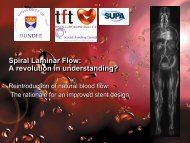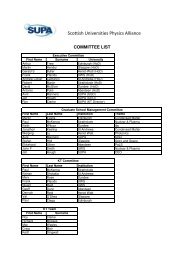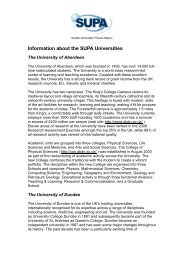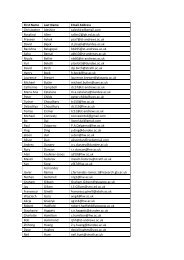Catalogue of Courses & Student Handbook - SUPA
Catalogue of Courses & Student Handbook - SUPA
Catalogue of Courses & Student Handbook - SUPA
Create successful ePaper yourself
Turn your PDF publications into a flip-book with our unique Google optimized e-Paper software.
Physics and Life Sciences<br />
Biological Physics (<strong>SUPA</strong>BPS)<br />
Lecturer: Simon Titmuss<br />
Institution: Edinburgh<br />
Hours Equivalent Credit: 20<br />
Assessment: Written Assessment<br />
This is a level 11 undergraduate course organised by the University<br />
<strong>of</strong> Edinburgh. It would provide a physics based introduction to<br />
Biological Physics for students who have not taken such a course as<br />
undergraduates. This course will be taught to <strong>SUPA</strong> students as a<br />
Distance Learning course.<br />
Course Description<br />
There is an increased research effort devoted to problems at the<br />
interface between biology and physics. Increasingly it is recognized that<br />
physics can provide real insight into the behaviour <strong>of</strong> complex biological<br />
systems and that a physical approach to biological problems can<br />
provide a better way <strong>of</strong> looking at the world. This course will introduce<br />
students to the basics <strong>of</strong> biological systems and provide examples <strong>of</strong><br />
how familiar physical principles (thermodynamics, statistical mechanics)<br />
can be used to explain complex biological phenomena.<br />
Mathematical Modelling (<strong>SUPA</strong>MMD)<br />
Lecturer: Marco Theil<br />
Institution: Aberdeen<br />
Hours Equivalent Credit: 32<br />
Assessment: Continuous Assessment<br />
This is a final year undergraduate course organised by the University<br />
<strong>of</strong> Aberdeen.<br />
Course Description<br />
Physical Sciences intend to describe natural phenomena in<br />
mathematical terms. This course bridges the gap between standard<br />
courses in physical sciences, where successful mathematical models<br />
are described, and scientific research, where new mathematical models<br />
have to be developed. <strong>Student</strong>s will learn the art <strong>of</strong> mathematical<br />
modelling, which will enable them to develop new mathematical<br />
models for the description <strong>of</strong> natural systems. Examples from a wide<br />
range <strong>of</strong> phenomena will be discussed, e.g., from biology, ecology,<br />
engineering, physics, physiology and psychology. A focus will be the<br />
critical interpretation <strong>of</strong> the mathematical models and their predictions.<br />
The applicability <strong>of</strong> the models will be assessed and their use for the<br />
respective branch <strong>of</strong> the natural sciences will be discussed. Many<br />
difference modelling techniques (ODEs, PDEs, cellular automata,<br />
stochastic models (stochastic DE, TASEP and ARMA), network based<br />
models, etc) will be taught and actively applied to different areas in<br />
physical and life sciences. The topic <strong>of</strong> the modelling project will be<br />
agreed upon jointly by the student and the lecturer; it might well be<br />
related to the postgraduate work <strong>of</strong> the student.<br />
Introductory Biology School (<strong>SUPA</strong>IBS)<br />
Lecturer: Paul Reynolds<br />
Institution: St Andrews<br />
Hours Equivalent Credit: 15<br />
Assessment: Written Assignment<br />
This is a Residential course running annually in January 2014.<br />
Please contact the <strong>SUPA</strong> courses <strong>of</strong>fice at admin@supa.ac.uk<br />
when requested to reserve your place. The course will not be open for<br />
online enrolment and will be restricted to 20 places in January 2014.<br />
Course Description<br />
<strong>Student</strong>s entering the PALS theme come from a variety <strong>of</strong> backgrounds,<br />
and your needs as graduate students are enormously varied. Some<br />
<strong>of</strong> you will be handling biological materials, some will be carrying out<br />
molecular experimental projects, and some will be involved almost<br />
entirely with theory or simulation. In order to be productive PhD<br />
students, however, all students need a basic grounding in Biology and<br />
the challenges <strong>of</strong> biological research. This short course is designed<br />
to give you a taster, an exposure to the language <strong>of</strong> biology, taught by<br />
biologists with extensive experience <strong>of</strong> working at the interface with the<br />
physical sciences. The Summer School will consist <strong>of</strong> three half-days<br />
<strong>of</strong> lectures from members <strong>of</strong> the School <strong>of</strong> Biology at St Andrews that<br />
will cover the very basics (the structure <strong>of</strong> a cell, cellular contents,<br />
and how they can be manipulated). The rest <strong>of</strong> the course will consist<br />
<strong>of</strong> two half-day practical sessions, covering the basics <strong>of</strong> handling<br />
and manipulating biological cells, performing useful microscopy,<br />
and taking quantitative measurements. Many <strong>of</strong> you coming into the<br />
PALS theme are likely to need to handle some biological materials<br />
(e.g. for microscopy or related applications), and we aim to teach<br />
you how to keep cells alive, or if tissues or samples are fixed, what<br />
to look for to ensure samples are <strong>of</strong> good quality. For those students<br />
undertaking non-experimental programmes, we hope that this exposure<br />
will demonstrate the “messy” nature <strong>of</strong> biological experiment and its<br />
associated inherent uncertainty.<br />
Physics and Life Sciences Short Research Project (<strong>SUPA</strong>SRP)<br />
Lecturer: Cait MacPhee<br />
Institution: Various <strong>SUPA</strong> institutions<br />
Hours Equivalent Credit: 40+<br />
Assessment: Short thesis to be submitted within one month <strong>of</strong><br />
completing the project.<br />
This course is to be carried out over 3 months during Year 1 or 2.<br />
Course Description<br />
<strong>Student</strong>s in the PALS theme should aim to be working closely with<br />
collaborators from the Life Sciences. The purpose <strong>of</strong> this project is<br />
to allow students to immerse themselves in a Life Science laboratory<br />
for three months, learning the techniques and language <strong>of</strong> biological<br />
research, and networking with their peers. The research undertaken<br />
should be relevant to the proposed area <strong>of</strong> PhD study since the<br />
duration <strong>of</strong> PhD funding cannot be extended. Projects will be <strong>of</strong>fered<br />
by appropriate research laboratories in Life Science disciplines, <strong>of</strong>ten<br />
but not always to align with existing programmes and collaborations.<br />
The existence <strong>of</strong> an existing collaboration between research groups is<br />
not a requirement. <strong>Student</strong>s will undertake a self-contained well-defined<br />
research project, and write a short thesis describing the background,<br />
methods, and outcome <strong>of</strong> their work, appropriate for an interdisciplinary<br />
audience. Individual project descriptions will be posted on the <strong>SUPA</strong><br />
website. Projects MUST be approved by the Theme Leader in advance,<br />
but project proposals may be put forward at any time.<br />
28







